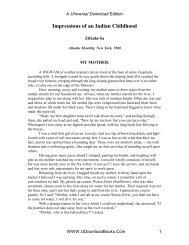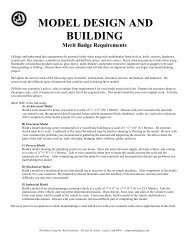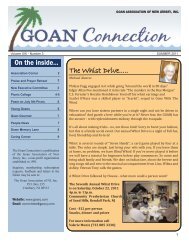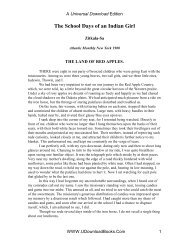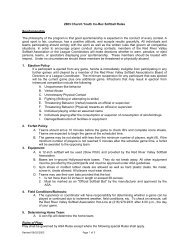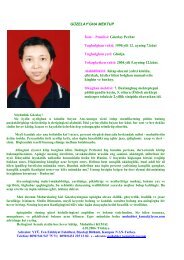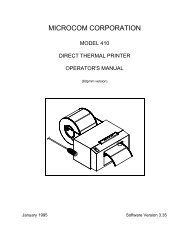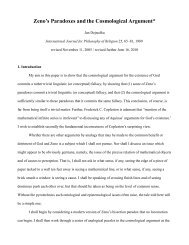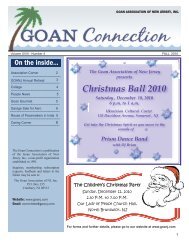Dummett's Backward Road to Frege and to Intuitionism - Tripod
Dummett's Backward Road to Frege and to Intuitionism - Tripod
Dummett's Backward Road to Frege and to Intuitionism - Tripod
You also want an ePaper? Increase the reach of your titles
YUMPU automatically turns print PDFs into web optimized ePapers that Google loves.
in which the reference is given <strong>to</strong> one who grasps the thought” (1991: 193). He takes this<br />
from Grundgesetze vol. 1, § 32 almost word for word, <strong>and</strong> it is perfectly correct. But it is a vast jump<br />
from this point <strong>to</strong> the thesis that a sense can be cognitively identified via cognitively identifying the<br />
reference first. Not only is the jump a logical non sequitur, but the point is not even evidence for the<br />
thesis. If you choose <strong>to</strong> present a reference in a certain way, I must grasp your way first, then via that,<br />
your reference; <strong>and</strong> you must have grasped some way first as well. In fact, the second part of the quote<br />
states the forward road from senses <strong>to</strong> references.<br />
Dummett says that “the systematic theory of Bedeutung provided a basis for explaining in what<br />
the Sinn of an expression should be taken <strong>to</strong> consist, namely the way in which its Bedeutung is given <strong>to</strong><br />
a competent speaker of the language” (1995: 4–5). I agree, if this is merely the explanation of what<br />
senses are in terms of how they function. I believe that is the explanation behind the explanation in<br />
Grundgesetze vol. 1, § 32. But Dummett’s program makes it sound for all the world as if § 32 implies<br />
that given the truth-conditions of L, references are cognitively identified (said) <strong>and</strong> senses then are<br />
cognitively identified derivatively (shown when references are said), or at least can be if we choose our<br />
senses right. This suggests that the following definition (not: explanation) of senses is basic <strong>to</strong><br />
Dummett’s program:<br />
the sense of expression “A” =Df the way in which the reference of “A” is given <strong>to</strong> a<br />
competent speaker of the language, or the way the reference of “A” would be given <strong>to</strong><br />
such a speaker if “A” had a reference<br />
This takes the backward road. Senses are mentioned only in the definiendum, <strong>and</strong> references only in the<br />
definiens. Given the reference of “A”, we can define the sense of “A”. But there are two problems.<br />
First, there would be no primitive senses, since all senses would be defined. This is wrong because<br />
29




